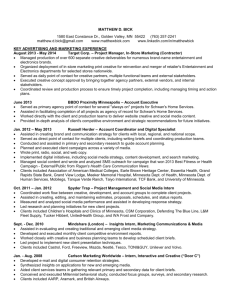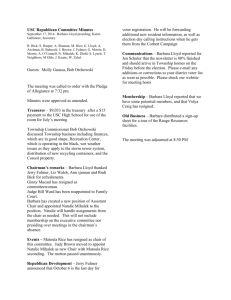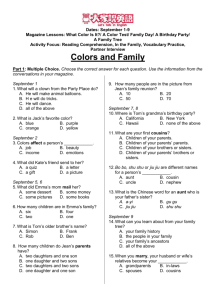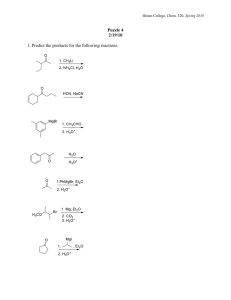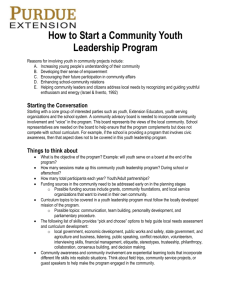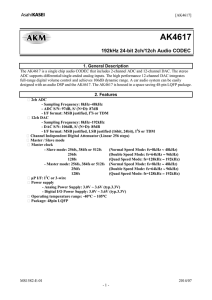A Visit to Southern Indiana 1934 (00361264)
advertisement
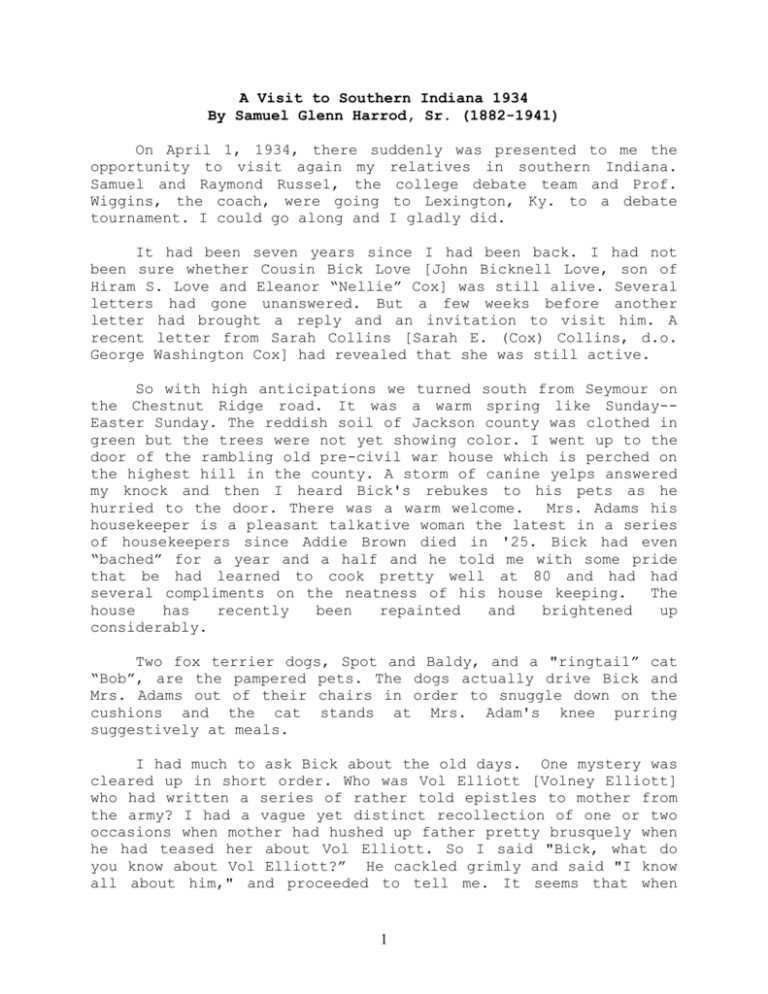
A Visit to Southern Indiana 1934 By Samuel Glenn Harrod, Sr. (1882-1941) On April 1, 1934, there suddenly was presented to me the opportunity to visit again my relatives in southern Indiana. Samuel and Raymond Russe1, the college debate team and Prof. Wiggins, the coach, were going to Lexington, Ky. to a debate tournament. I could go along and I gladly did. It had been seven years since I had been back. I had not been sure whether Cousin Bick Love [John Bicknell Love, son of Hiram S. Love and Eleanor “Nellie” Cox] was still alive. Several letters had gone unanswered. But a few weeks before another letter had brought a reply and an invitation to visit him. A recent letter from Sarah Collins [Sarah E. (Cox) Collins, d.o. George Washington Cox] had revealed that she was still active. So with high anticipations we turned south from Seymour on the Chestnut Ridge road. It was a warm spring like Sunday-Easter Sunday. The reddish soil of Jackson county was clothed in green but the trees were not yet showing color. I went up to the door of the rambling old pre-civil war house which is perched on the highest hill in the county. A storm of canine yelps answered my knock and then I heard Bick's rebukes to his pets as he hurried to the door. There was a warm welcome. Mrs. Adams his housekeeper is a pleasant talkative woman the latest in a series of housekeepers since Addie Brown died in '25. Bick had even “bached” for a year and a half and he told me with some pride that be had learned to cook pretty well at 80 and had had several compliments on the neatness of his house keeping. The house has recently been repainted and brightened up considerably. Two fox terrier dogs, Spot and Baldy, and a "ringtai1” cat “Bob”, are the pampered pets. The dogs actually drive Bick and Mrs. Adams out of their chairs in order to snuggle down on the cushions and the cat stands at Mrs. Adam's knee purring suggestively at meals. I had much to ask Bick about the old days. One mystery was cleared up in short order. Who was Vol Elliott [Volney Elliott] who had written a series of rather told epistles to mother from the army? I had a vague yet distinct recollection of one or two occasions when mother had hushed up father pretty brusquely when he had teased her about Vol Elliott. So I said "Bick, what do you know about Vol Elliott?” He cackled grimly and said "I know all about him," and proceeded to tell me. It seems that when 1 mother put a quietus on his plan to come by St. Augustine and visit her when he was discharged, the refusal didn't seriously cast him down. I imagine he was hard to discourage. He went back to Chestnut Ridge and was soon in a violent love affair with Bick's sister, Serelda. Serelda was red haired and evidently had a will of her own. Bick says that he remembers seeing Uncle Hiram eject Vol from the yard at the toe of his boot. “But" said Bick, "Serelda would have married him in spite of all if— something hadn't happened." After the war Jackson Co. was afflicted with many deeds of violence. Banks were robbed, a rich merchant of Brownstown going to Cincinnati with a full wallet was murdered and his body thrown in the river. Several people who knew too much of the gang were called to their door and shot down. It seemed that the law was powerless. So vigilance committees were formed, a detective was brought in who under the guise of a sewing machine agent quietly collected evidence . Bick remembers this little fellow coming to their house trying to sell Aunt Nellie [Eleanor (Cox) Love] a machine. The Reno boys--sons of a well-to-do farmer north of Seymour were leaders of the outlaws. Vol Elliott was a member of the gang. One Sunday afternoon his old mother was buried in the little cemetery on the Ridge. That night the degenerate son helped hold up a B.& O. train west of Seymour. But the little sewing machine peddler wormed his way into the inner circles and betrayed the plot to the vigilance committee. The train robbers, five in number were captured, and morning saw their lifeless bodies hanging from roadside trees. Thirteen lynchings took place in Jackson Co. in that year of 1867. It was a violent remedy but effective. The gang was no more. So from Bick's lips I found out at least what mother didn't want me to know about when I was a boy. The 145th Indiana was not the best environment for young fellows it seems. Vol Elliott was not improved at least. In one of the letters he wrote to mother he said that on a march he and "Nate Moore" straggled "a day in the rear of their comrades evidently for the purpose of forazing and robbing. Nate Moore [son of Keziah (Cox) Moore] came home a drunkard and became a regular sot. Bick said that he was working for Uncle Hiram and one Saturday he went into Seymour and the next morning was found dead in an alley. Then father's favorite cousin and close chum, Marsh [Joseph Marshall Harrod, son of Allen Hamilton Harrod], got to drinking while in the army. 2 The shock to poor headstrong Serelda must have been great, but consolation seems soon to have come. Two orphans, Leonard and Delia Brown--had recently come into the community. Leonard was an ex-soldier. He had been a bugler. He taught a music school on Chestnut Ridge and then Uncle Hiram hired him to build a barn for him for he was a carpenter too. The young barn builder of course boarded in the family. He and Serelda fell in love and were married. The marriage was a happy one although it was not fated to continue long. Serelda died in '76 at the birth of her third son. Her husband died in ’78. When Serelda Love became Serelda Brown, Uncle Hiram and Aunt Nellie took into her place in their home Leonard's sister Delia. There she lived till her death in 1923, loved as a daughter by Hiram and Nellie as a sister by the boys. When the three little boys, Alvin, Frank, and Willie, were left orphans they too came into the Love home and were reared under Delia's care. When Jim married late in the late ‘90s and Uncle Hiram died in '99 Delia and Bick lived on together in spite of some gossip from those inclined to evil thoughts. Jim's marital venture proved a failure and after a time he too came back to live with Bick and Delia. As Delia grew older, Bick suggested to her one day that she ask her cousin Addie who lived in Cincinnati to come and stay with them. Addie had always lived in the city but she soon adjusted herself and grew to love the Ridge like the others. When Delia died, Addie carried on. She was presiding over the home when Sam, Virginia and I visited Jim and Bick in 1924. Jim died that same year and Addie the next. Since the Brown boys were gone--Alvin in the South, Frank a veterinary in Seymour and Willie a physician for the Pennsy R.R. at Ft. Wayne--Bick has had to do the best he can. Mrs. Adams has been with him more than two years and seems to be very congenial. I had known little of the Loves of Chestnut Ridge. I therefore took occasion to ask Bick all about them. They were Scotch-Irish and lived first in South Carolina but when they decided to move to Indiana they had for some time lived in Roane Co., Tenn on Clinch River. John Love (1776-1850) had gone with Andy Jackson to New Orleans in 1814 and fought the British at New Orleans in the final battle of the war. He and his brotherin-law, Jack Draper were making their way back home through the wilderness when they got entangled in swamps and bayous and were nearly starving. In this extremity one of them saw a few ears of corn floating down stream. One of them waded in and salvaged these. A fire was quickly built and as the corn was parching John who was a staunch Methodist struck up a hymn. Jack said, "John, how can you sing when we are in such a wretched plight?" 3 To which John stoutly replied "Why not sing praise to God for the ears of corn?" In 1819 John and his wife Nancy (1796-1860) with their family set out on their long journey to Indiana. The family consisted of Abraham, 19 years old, Fanny, 17, Beaufort, 14, Braxton, 14, Madison (Uncle Matt), Elizabeth, Hiram, 2 years old and John R., a baby in arms--literally in arms for his mother rode her horse and carried him most of the way. The Loves settled on the north end of the Ridge. The south end was thickly populated with Cox families lately come from Kentucky. Abraham married Eunice Shewmaker, daughter of a Clinch River neighbor and lived his life in Jackson Co. He was a shrewd and successful trader. He was lame and for that reason almost lived on his horse’s back. Delia remembered one caustic comment of his. She was out sweeping the front walk one morning shortly after she had come to live at Uncle Hiram's. Uncle Abe rode by and said, "Are you sure the inside is clean?" Fanny married first Rufus Faulkner and later Jacob Fislar. She lived to be a very old woman. Bick remembers that one day his mother was out at the gate saying goodbye to a wagon load of visitors. As they rolled away she cast her eyes down the road other way and beheld another crowd arriving. In perhaps justifiable irritation she cried, "One load goes but for another to come!" She spoke just a bit too loudly however. Aunt Fanny Fislar was in the arriving wagonload and her sharp ears caught the remark. There was a little coolness between the two sisters-in-law for awhile. Beaufort married Nancy Carter but died in '32. Braxton married Martha Carter. He it was who built the huge old house in which Bick now lives. Bick remembers watching the slow process of its construction in the late 50's. It was three years a building. Its timbers were carefully mortised and its boards were all hand planed. Braxton, too prospered and owned many hundreds of acres of land. In the 60's he sold his land and after keeping a tavern in Seymour for a while removed to Kansas. Madison married Polly Johnson and lived and died on the Ridge. 4 Elizabeth married Art Wheeler. In 1840 Hiram (1817-99) married Nellie Cox (1813-92). Through this marriage came my relations to the Loves since Nellie was grandfather's [James Cox’s] sister. I asked Bick to tell me something of his father. He said he was over six feet tall, had light hair and blue eyes. He was a peaceable sort of a man but when roused he was dangerous. Bick said there was a rule against swearing in the family and Uncle Hiram vigorously enforced it on the boys but when he himself got into a rage he would swear like the traditional trooper. This produced in Bick a sense of injustice which seventy years have not quite obliterated. I had heard Auntie [Lavinia Cox] tell of hearing Uncle Hiram break out into song in the night watches and sing hymn after hymn. I had always supposed that he did it to while away hours of wakefulness but Bick set me right. He says his father sang in his sleep. "How Firm a Foundation" was his favorite "lead off" piece and Bick says that many is the time he has joined in and sang bass in these nocturnal concerts and Uncle Hiram none the wiser. I recall another story that Mother and Auntie [Lavinia] told of their visits to the relatives on the Ridge. Some of them had two boards hung to the ceiling and coated on the inside surfaces with molasses. It was the duty as well as privilege of every one who passed near to clap these boards together to the end that some of the sweet loving flies might perish. Bick doesn't think that this ingenious contrivance was used at their house but he recalls a swinging frame adorned with paper fringes which he himself designed and constructed. This hung over the table and when it was vibrated back and forth by a cord it tended to give the flies in the vicinity the jitters. Uncle Hiram joined the Christian Church in 1866 and became greatly interested in church activities. He was one of the prime movers in erecting the house of worship which stood till recently across the road from the burying ground. Bick recalls a visit which Lizzie Harrod [Elizabeth Harrod, daughter of Allen Hamilton Harrod and Ailcy Cox] made to their home about 1870. The object of the visit he said was to cause her to forget a certain Elmer Brown who wasn't regarded with much favor by Uncle Hamilton. Lizzie and Delia “made a pair” so Bick says. They were ever lastingly playing practical jokes on him and another cousin who was working there. The main purpose 5 of the visit was a flat failure. Lizzie had a good visit and then went back home and married Elmer even more enthusiastically than she would have done before. Well, Elmer was a pretty good sort and she could have done much worse. Bick had a story of Morgan's raid too. The Ridge was of course in an uproar as well as a hundred other communities in Southern Indiana. There was a piece of timber near them which had been cut over and the tops left on the ground. Into this impenetrable jungle they drove their horses for Morgan was hard on horses and had to have replacements. Some man was staying with them and he talked very valiantly about what he would do if the miserable rebels came along. He had two revolvers and demonstrated before the boy's eyes how he would mow the invaders down. Uncle Hiram wasn't at home I guess and of course Blue was in the union army. One night the household was aroused by galloping horses and the jingle of sabres. All was excitement. Morgan was at hand. They stopped in front of the house and summoned the householders forth. Aunt Nellie and Bick went out--and found that it was a body of Union cavalry, part of the tens of thousands trying to catch Morgan. They wanted water for their horses. So Bick pumped and pumped. Finally they rode on. Where was their valiant defender? His pistols were by his bed but he was gone. Morning revealed some tracks very far apart leading through the potato patch back of the house to the woods. Morgan did come through however and commandeered many horses but Uncle Hiram's he didn't find. Uncle Hiram and Aunt Nellie had the following children Beaufort [nicknamed “Blue”] served in the 139th Ind. Inf. which later became the 8th Cavalry. He visited our people in Illinois after the war. He married Belle Holmes and had 3 children. Mary who has been for 44 years an attendant in the State Hospital for the Insane at Indianapolis. I saw her for the first time the day I left Bick’s. She had come down for a visit since she has recently been "fired" by Gov. N. Nutt. Laura who died unmarried and Hiram who lives in Indianapolis. The second in the family was James K. Polk. When well along in years he married Vinnie Shepherd and had a daughter Eleanor (Mrs. Clark Simpson). He and his wife separated and he was living with Bick when we were there in '24. Serelda was the third child. Bick says she had the most beautiful golden hair he ever saw. I've already told of her marriage. Melvina, born 6 in 1850 died in 1865 of consumption. Since she had no picture a picture was taken after her death, her body propped up in a chair. We have a copy of this gruesome photo. Bick was the fifth child, born in ‘5l. He never married in this respect patterning after his Uncle John who also was a bachelor. The youngest, Thornton Addison, born ‘53 nicknamed Jabez by Bick and the nickname has a place alongside the real name on the stone which records his death in '66 of "spotted fever". On Monday morning Bick arranged with his roomer, a C.W.A. man who with a child, wife and two babies occupied part of the upstairs to crank up his wheezy old T model and take us to see Sarah Collins who was living with her daughter, Ada Governor, a widow with several grown sons. As we dropped down the southern slope of the Ridge in the chill April sunshine Bick pointed out on the left the old George Cox homestead. The roomy red brick house where I had first seen Sarah and Jess Collins was now empty. Bick said that one of Sarah's daughters married a German lad who farmed the place and lived with Sarah on the old home but Bick said, "Sarah can’t get along with anybody". So the farming operations proved to be a cause of friction. Son-in-law didn't farm just like the lamented Jess. So the daughter and her Dutchman moved out and now Sarah is very restlessly abiding on a neighboring farm with the Governors. If her children would let her do so, she would move back and live alone with her memories. We found Ada Governor with a bad headache and Sarah visiting her sons in Crothersville. So we drove back and tried to call on Crawford Cox who lives in a comfortable looking log house on the west slope of the Ridge. As we rattled up, there was a chorus of dogs greeted us. Happily these animals were chained in various places. No efforts in the way of calling and banging produced results. We learned later that they had gone to Brownstown. We loitered about hoping someone would turn up. The home is very attractively placed in a grove of fir trees. Bick said that every year Mrs. Crawford Cox’s people have a reunion here. It is a good place for such a gathering. After a while we gave it up and drove home. Mrs. Adams had taken advantage of our presumed absence for the day to wash and was somewhat upset by our unseasonable return. She made the best of it and I made a bit by helping her with the dishes. In the afternoon came Crawford Cox, his wife Deanie, his daughter Edna Smith, and a couple of grandchildren. 7 Crawford is a very friendly man some 65 years old, thin with a fresh complexion. His wife, a fat comfortable woman who probably likes pie. Edna is a very talkative young mother, rather "sloppy" in appearance. She confided that her husband was a sort of mail order acquisition. That is, she began writing to him by some chance during the war when he was in the service. Hick says he is a fine industrious man. In the course of my genealogical investigations I found that Crawford's brother George lives at Heyworth. He said he'd like to come out and visit him and us but Deanie has heart trouble and he wouldn't under any consideration leave her nor was she able to go along. That evening Bick and I did a little duet work. He got a couple of old hymnbooks and a tuning fork and we were marching steadily along through the old favorites (Bick doing a surprisingly good bass) when Cousin Sarah Collins, her daughter Ada Governor, and one of young farmer sons came to call. Cousin Sarah is rather thin and didn't look as much like mother as she did ten years ago. She was dressed very carefully and rather elegantly. That was like mother. We chatted for an hour and a half or so. She remembered the visit which grandfather, grandmother and Lemen made on the Ridge in 1860. I asked about Dr. Green whom Lemen mentioned in the letter and who promised to cure grandfather if he would stay the winter. She said that the treatment which Dr. Green used she remembers very well and I don't wonder at that for it certainly was unusual. Two or three times a day grandfather stood with bare head and neck while someone standing ten feet or so above him on a ladder poured a stream of cold water on the back of his head and neck. This must have been strenuous treatment in the winter. She said the relatives thought that Jim thought he was worse off than he was. Bick says Sarah is a great taker of medicine. needs all she takes. She doesn't look well. Perhaps she Tuesday morning we went in out chugging Ford to Seymour and called on Jerusha Sweeney, the third of mother's living cousins. She lives in a neat home in a middle class section of the city. She was very cordial and very "breezy”. She laughed a good deal and enjoyed a joke. She lives with a granddaughter who works in an office down town. A second daughter, Mabel, we met. She is a graduate of Danville Normal and roomed she said with a girl from Dor while there. She has been teaching three years but is now out of work. She is good looking and I'm sure a capable teacher but is becoming a bit cynical I fear as a result of her 8 recent experiences. Jerusha was telling, of the third granddaughter who she said was "in Louisville in the Baptist Church". Mabel said, “Grandmother you mean the Baptist hospital". "Oh well," rejoined the delightful Jerusha, "If mistakes was haystacks, all the horses would be fat." I liked her for that saying. She too remembered Lemon and her Ellen [Eleanor (Babbitt) Cox]. She stayed at her father's home most of found more cousins of his own age and didn’t stay around so much. Uncle Jim [Cox] and Aunt said that Jim and Ellen the time but that Lemon heart somewhere else and We had to leave all too soon to suit me and went to see Frank Brown. Frank, a veterinary, we found finishing the delicate operation of amputating the tail of a little fox terrier pup. They had three dogs, a huge cat, a dozen or so canaries and a parrot. The parrot named Tom, insisted on telling me goodbye. They had had Tom nine years and this spring he started laying eggs! No one was more astonished than Tom. He examined the first egg with such meticulous care that he broke it. Others were rescued and on exhibition. The Browns have one daughter, Dorothy. She has been one year at Evansville college and is crazy to go to school of music to continue her work in pipe organ. She works down town in an office and plays the organ in one of the churches. She is a very unattractive girl but is pleasant and sensible. That afternoon, I went to Austin on the interurban. By the way the Louisville Indianapolis line of the interurban has frequent cars and the fare is very low. They say it is making money. I rang the bell of the Morgan mansion and cousin Marion opened. She asked suspiciously who I was and when I told her she seemed neither shocked nor overjoyed. She ushered me into the drawing room and vanished. Some little time passed. Then to my surprise in walked cousin Gardner Harrod who had been for two years or so in the Southwest trying to rid himself of tuberculosis. He is recently married and had been introducing his pleasant little wife to his relatives. Soon Fern [Fern (Harrod) Morgan, daughter of Charles Freemont Harrod] appeared. I think she had been at Louisville at a dentist's. She explained to some extent Marion's strange behaviour. She had gone out to the kitchen and fainted. She had been at the dentist's too and having a tooth pulled and seeing me was too much for one single afternoon. 9 Fern took a basket of food and took me in her car to Scottsburg to Aunt Maggie's [Margaret Gardner, second wife of Jeptha Revel Harrod] where Aunt Olive [Olive Gardner, wife of Charles Freemont Harrod] was too. They had just got back from Florida and Aunt Olive was nearly blind as a result of a hemorrhage in the retina. We had a pleasant dinner together and drove back to Austin. Ivan Morgan got in late that night and I saw him a few moments at breakfast. Jack was out and gone to the factory early. I barely greeted him. Ivan said that one of his men would take me anywhere I wanted to go. So I decided to go out to the old home place to which Cousin Leland has recently come back after four years managing the county farm. It always gives me a thrill to get back to this place where William Harrod settled in the savage infested wilderness, where Betsy New lived six months without seeing a white woman and where Sam Harrod lived his long and useful life. Leland and Luva were hospitable. They are alone. Their elder daughter is at Purdue and had not many weeks before startled them one evening about six o'clock by rushing in with her boy friend a senior at Purdue and beseeching them to give their consent to an immediate marriage. Luva stood out against it for a couple of hours but finally "caved in". They were married at Scottsburg and back at Purdue for 8 o'clock class the next morning. Nobody said whether they had their lessons. The boy is a Scott Co. boy named Mace and must be a brilliant student because he has a good fat fellowship in the graduate school at Cornell. His parents are well to do farmers. Luva is still pretty much upset about it all. The younger girl, Laverne, is a freshman in Scottsburg High and lives with Luva’s brother in Austin during school. Leland is a good farmer I think. He farmed in Iowa and keeps up on modern methods. He spent beating off a farm agent who wanted him to legislature as a farm candidate. As he is a couldn’t see much point to such a race this year. several years an hour or so run for the Republican he Luva apologized profusely for not having bread and being compelled to offer the poor substitute nice fluffy biscuit. In the afternoon, I went over to the old log house where Uncle Isaac lived. Charlie A. Harrod’s widow, May Cox, her son and her daughter, Zera, her daughter's husband, and a flock of grandchildren live here in poverty and apparently in great 10 content. The house was untidy--yea, dirty. May was not neat in appearance but she didn't worry a bit about that. She laughs easily and I'm sure atra cara was no where about. One whole side of the little living room is taken up by an atrocious oil painting executed by Charlie. Both Charlie and Lon had some native artistic ability but it was never trained. As I was going back an ancient sitting on the porch of the old Giles Cochran home hailed me, "Are you a stranger? Come and talk a while." I came. It was Hoffman Mitchell whom I've heard father mention often. He was sitting in the sun digging his bare toes into the soft earth. He told me that he had lived in Illinois near Decatur for a while but the climate was too much for him! Winds made him have a cold all the time. After supper Leland and Luva took me to Scottsburg to a farm bureau meeting at which a play was given. Leland was in the cast and did very well indeed. It was supposed to show how cooperation of farmers would get them the things they wanted. When we got back to Austin I was a little taken aback by finding Fern's house all dark. Leland said just to walk in and go to bed. This I did. 11




